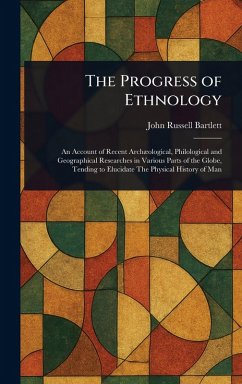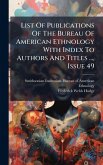"The Progress of Ethnology: An Account of Recent Archaeological, Philological and Geographical Researches in Various Parts of the Globe" by John Russell Bartlett offers a fascinating glimpse into the historical study of humankind. This meticulously prepared print republication explores the field of ethnology through the lens of 19th-century scientific inquiry. Delve into accounts of archaeological discoveries, philological analyses, and geographical explorations that shaped early understanding of diverse cultures. Bartlett's work provides a valuable historical perspective on the development of cultural research. Explore the history of ethnology and its connections to social history. This volume is essential for anyone interested in the history of social sciences and the origins of anthropological thought. This work has been selected by scholars as being culturally important, and is part of the knowledge base of civilization as we know it. This work is in the public domain in the United States of America, and possibly other nations. Within the United States, you may freely copy and distribute this work, as no entity (individual or corporate) has a copyright on the body of the work. Scholars believe, and we concur, that this work is important enough to be preserved, reproduced, and made generally available to the public. We appreciate your support of the preservation process, and thank you for being an important part of keeping this knowledge alive and relevant.
Bitte wählen Sie Ihr Anliegen aus.
Rechnungen
Retourenschein anfordern
Bestellstatus
Storno




![The Ethnology of the British Colonies and Dependencies [microform] The Ethnology of the British Colonies and Dependencies [microform]](https://bilder.buecher.de/produkte/65/65519/65519067m.jpg)




